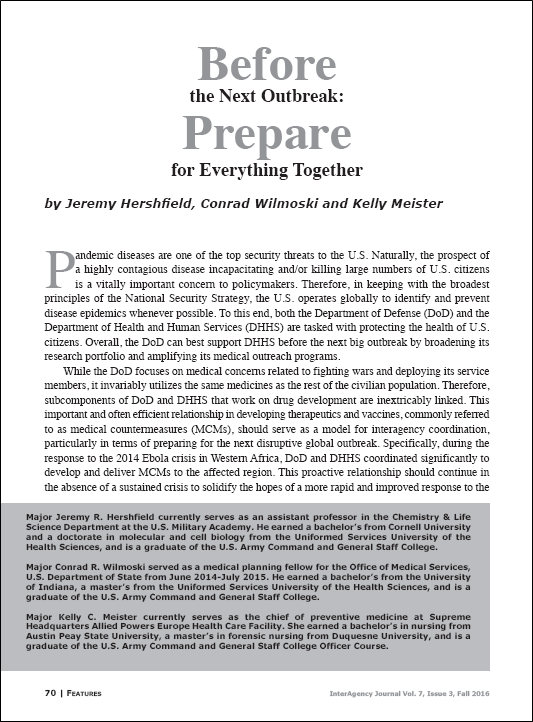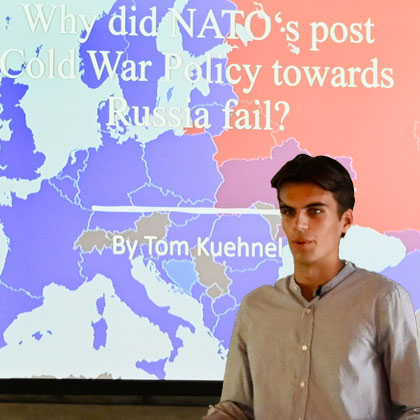Featured Article: Before the Next Outbreak
Featured article:
Before the Next Outbreak: Prepare for Everything Together
by Jeremy Hershfield, Conrad Wilmoski and Kelly Meister
Pandemic diseases are one of the top security threats to the U.S. Naturally, the prospect of a highly contagious disease incapacitating and/or killing large numbers of U.S. citizens is a vitally important concern to policymakers. Therefore, in keeping with the broadest principles of the National Security Strategy, the U.S. operates globally to identify and prevent disease epidemics whenever possible. To this end, both the Department of Defense (DoD) and the Department of Health and Human Services (DHHS) are tasked with protecting the health of U.S. citizens. Overall, the DoD can best support DHHS before the next big outbreak by broadening its research portfolio and amplifying its medical outreach programs.
While the DoD focuses on medical concerns related to fighting wars and deploying its service members, it invariably utilizes the same medicines as the rest of the civilian population. Therefore, subcomponents of DoD and DHHS that work on drug development are inextricably linked. This important and often efficient relationship in developing therapeutics and vaccines, commonly referred to as medical countermeasures (MCMs), should serve as a model for interagency coordination, particularly in terms of preparing for the next disruptive global outbreak. Specifically, during the response to the 2014 Ebola crisis in Western Africa, DoD and DHHS coordinated significantly to develop and deliver MCMs to the affected region. This proactive relationship should continue in the absence of a sustained crisis to solidify the hopes of a more rapid and improved response to the next untreatable deadly disease ravaging another part of the world.
Read the full article
Before the Next Outbreak: Prepare for Everything Together PDF
Download the complete edition
IAJ 7-3 (Fall 2016) PDF
IAJ 7-3 (Fall 2016) ePub
Major Jeremy R. Hershfield currently serves as an assistant professor in the Chemistry & Life Science Department at the U.S. Military Academy. He earned a bachelor’s from Cornell University and a doctorate in molecular and cell biology from the Uniformed Services University of the Health Sciences, and is a graduate of the U.S. Army Command and General Staff College. Major Conrad R. Wilmoski served as a medical planning fellow for the Office of Medical Services, U.S. Department of State from June 2014-July 2015. He earned a bachelor’s from the University of Indiana, a master’s from the Uniformed Services University of the Health Sciences, and is a graduate of the U.S. Army Command and General Staff College.
Major Kelly C. Meister currently serves as the chief of preventive medicine at Supreme Headquarters Allied Powers Europe Health Care Facility. She earned a bachelor’s in nursing from Austin Peay State University, a master’s in forensic nursing from Duquesne University, and is a graduate of the U.S. Army Command and General Staff College Officer Course.

Posted: January 24, 2017 by Simons Center
READ THE LATEST UPDATES FROM THE SIMONS CENTER
"*" indicates required fields


